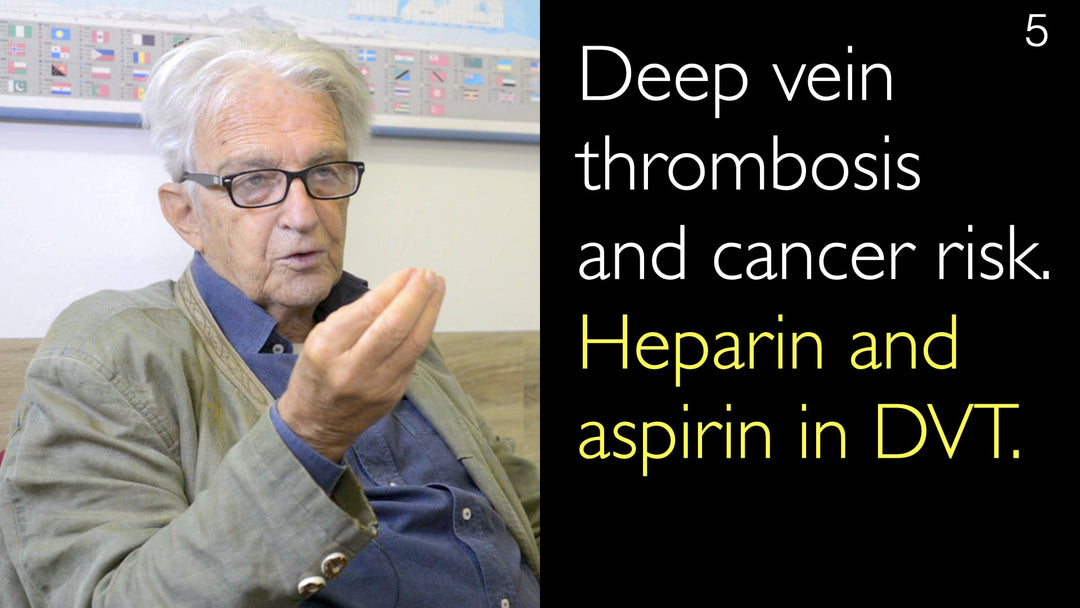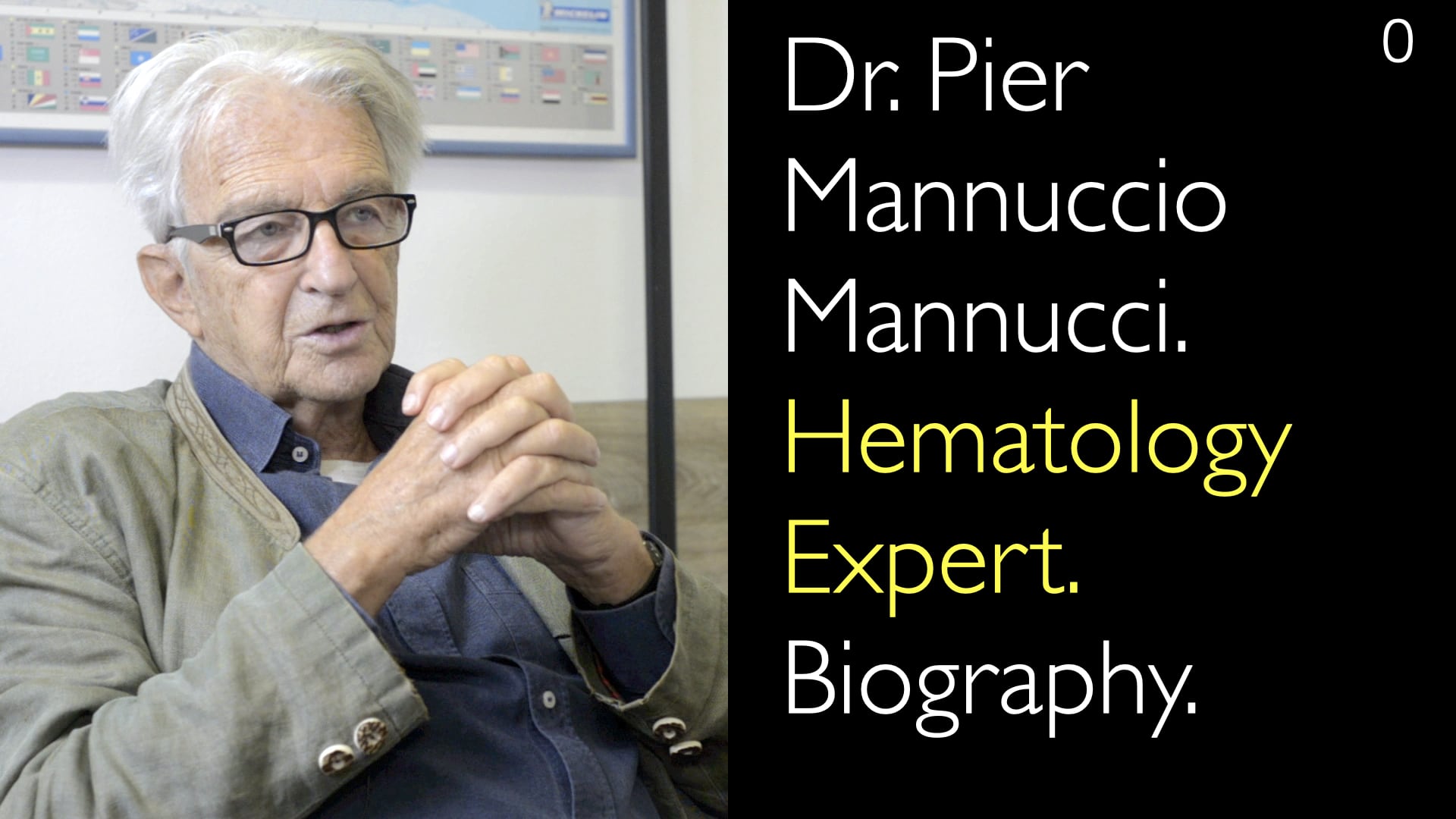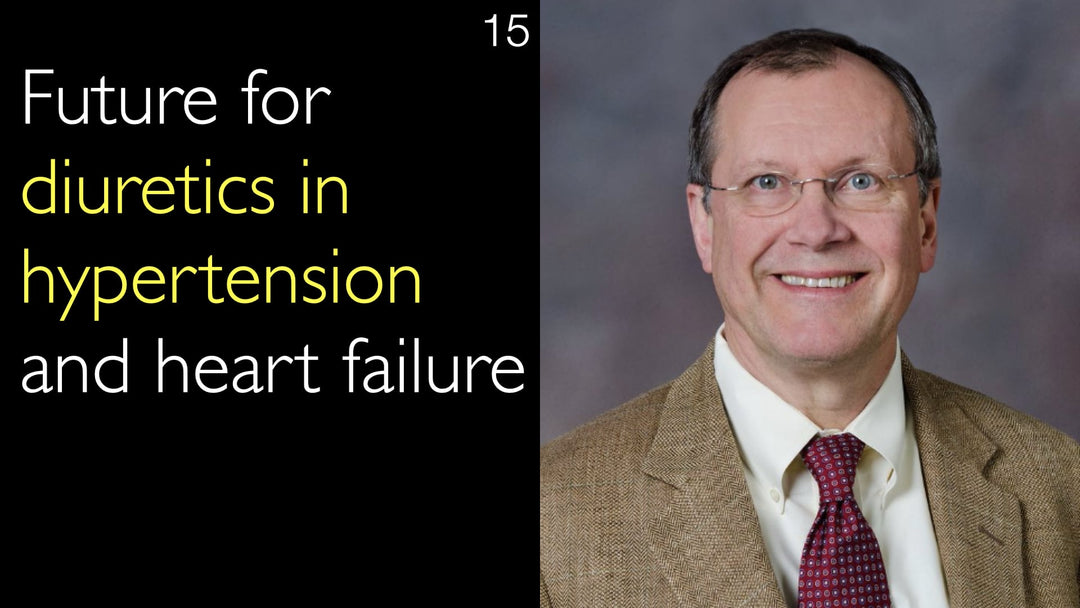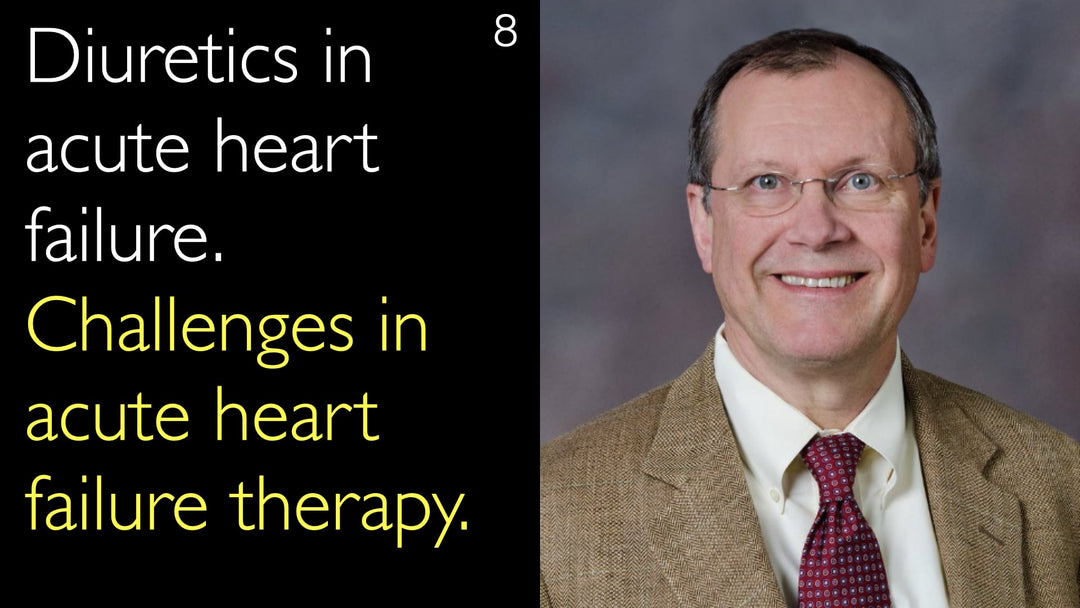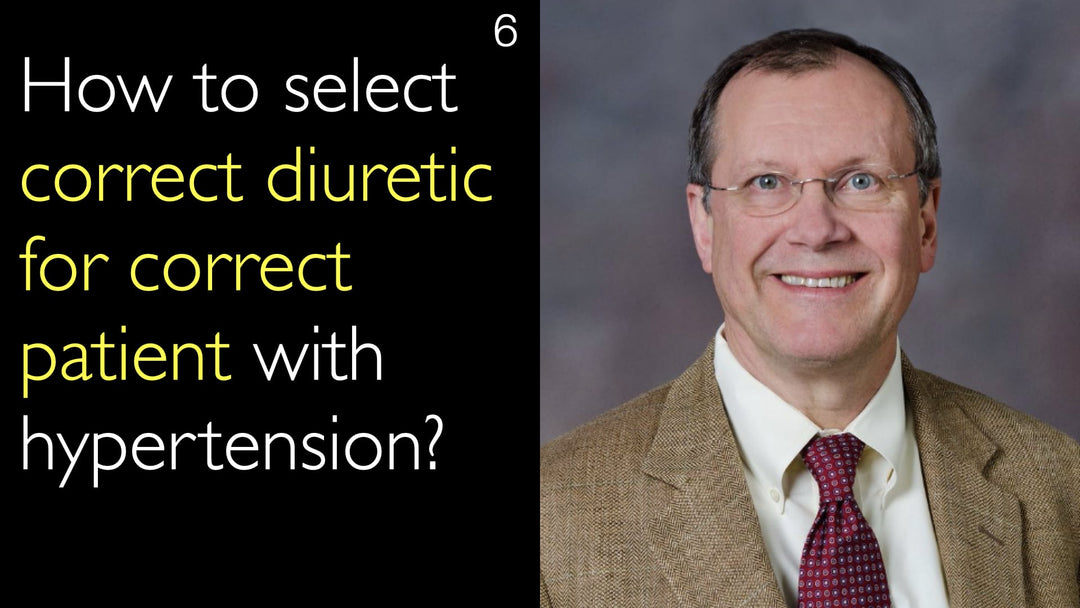혈전증 및 지혈 분야의 선도적 전문가인 Pier Mannucci 박사(MD)가 암과 혈전의 복잡한 연관성을 설명합니다. 그는 저분자량 헤파린(LMWH)과 직접 경구 항응고제(DOAC)가 암 환자의 혈전 예방 및 치료에 어떻게 활용되는지 상세히 논의합니다. Mannucci 박사는 심부정맥혈전증(DVT)이 암의 초기 신호일 수 있으나, 광범위한 선별 검사는 권장하지 않는다고 밝힙니다. 또한 항응고제의 암 치료에서의 제한적 역할과 암 예방을 위한 아스피린의 더 유망한 효과에 대해서도 다룹니다.
암, 혈전 및 항응고제 치료: 종합 가이드
목차
암과 혈전증의 연관성
암은 정맥 혈전증, 특히 심부정맥혈전증(DVT) 발생의 주요 위험 요인입니다. Pier Mannucci 박사는 이 위험이 항암치료나 수술 등 암 치료 과정에서 현저히 증가한다고 강조합니다. 췌장암이나 위장관암 같은 특정 암은 특히 혈전증 위험이 높습니다. 악성 종양과 연관된 과응고 상태는 환자 안전을 위해 선제적 대응이 필요함을 시사합니다.
항응고제 치료 옵션
암 환자의 혈전 예방 및 치료를 위해 항응고제는 표준 치료법입니다. Pier Mannucci 박사는 저분자량 헤파린(LMWH)과 직접 경구 항응고제(DOAC)를 주요 선택지로 꼽습니다. DOAC은 복용이 편리하지만 LMWH보다 효과가 뛰어나다는 증거는 아직 명확하지 않다고 지적합니다. LMWH는 혈소판 감소증이 있거나 화학요법으로 쇠약해진 환자군에서 혈전증 치료에 검증된 효과를 입증해 왔습니다.
DVT를 통한 암 선별 가능성
DVT 진단이 잠재적인 암의 첫 징후가 될 수 있습니다. Anton Titov 박사와의 논의에서 Mannucci 박사는 이 가능성을 인정하지만, 중요한 근거 기반 반론을 제시합니다: 다른 증상이 없는 특발성 DVT 환자에게 광범위한 암 선별 검사를 시행하는 것은 일반적으로 권장되지 않습니다. 이러한 검사는 비용 대비 효과가 낮을 뿐 아니라, 발견된 암의 경과를 개선하지 않는다는 것이 입증되었기 때문입니다.
암 치료에서 항응고제의 역할
헤파린 같은 항응고제를 암 치료나 전이 예방에 사용하는 방안이 연구된 바 있습니다. Pier Mannucci 박사는 이에 대해 냉정한 평가를 내립니다. 초기 실험 결과는 희망적이었지만, 인간 대상 임상 연구는 상당히 실망스러웠다고 말합니다. 그는 항응고제가 혈전 합병증 예방을 위해 사용될 뿐, 암의 확산이나 진행을 통제하기 위한 목적으로는 투여되지 않는다고 설명합니다. 직접적인 항암 치료로 사용할 경우 예상치 못한 문제를 초래할 수 있습니다.
암 예방과 아스피린
Anton Titov 박사와의 대화에서 아스피린의 암 예방 효과가 논의됩니다. Pier Mannucci 박사는 이 분야의 연구가 더 유망하다고 강조합니다. 심혈관 질환 예방을 위해 저용량 아스피린을 복용하는 대규모 집단을 관찰한 연구에서 대장암과 방광암 등 특정 암의 발생률이 낮게 나타났습니다. 아스피린이 전이하는 암 세포 주위의 보호막 형성을 막는 것이 메커니즘으로 제안됩니다. 현재 진행 중인 임상 시험은 이 잠재적 이점을 집중적으로 조사하고 있습니다.
임상 권장사항 및 결론
Pier Mannucci 박사는 실용적인 임상 지침으로 결론을 맺습니다. 그는 잠재적 부작용을 고려해 암 예방을 위한 아스피린 등 약물 사용은 명확한 1차 적응증이 있어야 한다고 강조합니다. 예를 들어 아스피린은 심혈관 질환 예방을 위해 처방될 때 암 위험 감소라는 부수적 이점을 기대할 수 있습니다. Anton Titov 박사와의 인터뷰는 혈전증 치료에서의 항응고제 사용과 직접적인 암 치료 및 예방이라는 보다 추측적인 영역을 구분하여 명쾌한 개요를 제공합니다.
전체 대본
Dr. Anton Titov, MD: 암과 정맥 혈전 형성 증가는 때로 동반됩니다. 심부정맥혈전증(DVT)이 암 존재의 첫 신호가 될 수 있습니다. 저분자량 헤파린은 암 환자의 혈전 합병증 예방에 사용되어 왔습니다. 나아가 저분자량 헤파린이 암 발생, 특히 전이 예방에 역할을 할 수도 있을까요? 저분자량 헤파린과 다른 항혈전 약물이 암 위험과 사망률을 줄일 수 있는 방법은 무엇인가요?
Dr. Pier Mannucci, MD: 암은 혈전증, 특히 정맥 혈전증의 잘 알려진 위험 요인입니다. 다른 위험 인자들보다 훨씬 강력합니다. 혈전증은 위험하며, 특히 화학요법 기간과 특정 암—위장관암, 췌장암—에서 그렇습니다. 하지만 모든 암에서, 특히 화학요법과 수술期間 동안 저분자량 헤파린이나 새로운 직접 경구 항응고제로 예방하는 것이 중요합니다.
이에 대해서는稍後 언급하겠습니다. 헤파린의 경우, 직접 경구 항응고제(DOAC)와 함께 선택 치료법입니다. 일부 환자는 예방 조치에도 혈전증이 발생합니다.
비타민 K 길항제와 비교해 화학요법 환자에서 출혈 위험이 입증되었습니다. 혈소판 감소증이 있거나 쇠약한 환자에게는 저분자량 헤파린이 혈전증 예방과 치료에 가장 효과적인 무기입니다.
최근 DOAC이 LMWH와 동등하다는 결과가 나왔지만, 이는 논란의 여지가 있습니다. DOAC이 더 우월하다는 확실한 증거는 없습니다. 다만 DOAC은 복부 주사가 필요 없다는 장점이 있습니다. 따라서 DOAC에는 몇 가지 이점이 있습니다.
일부에서는 DOAC이 약간 더 효과적이라고 확신하기도 합니다. 이것이 제가 암 환자의 혈전증 예방에 대해 생각하는 바입니다. 혈전증이 발생한 암 환자의 치료에도 해당합니다.
또한 혈전증이 암의 첫 징후가 될 수 있는지에 대해 간략히 언급했는데, 이는 매우 논쟁적인 주제입니다. 제 임상 경험상 혈전증으로 인해 암이 의심된 경우가 있기는 합니다.
그러나 진단된 암이 없는 혈전증 환자에게 광범위한 암 선별 검사를 시행하는 것은 가치가 없다고 입증되었습니다. 물론 혈전증에 나이 같은 다른 강력한 위험 인자가 더해지면 우려는 되겠지만, 광범위한 검사를 받지는 않을 것입니다. 선별 검사가 암 발견에 비용 효율적이지 않기 때문입니다.
더 중요한 것은, 혈전증 발견 후 암 선별 검사가 궁극적인 암 경과에 영향을 미치지 않는다는 점입니다. 이것이 핵심 메시지입니다.
서론에서 논의한 또 다른 주제는 저분자량 헤파린이나 다른 항응고제가 암 치료에 효과적인지 여부입니다. 응고와 혈전증 억제가 암 전이, 특히 전이 발생을 막는 데 도움이 될 수 있다는 실험 데이터가 있습니다.
제 전공 분야는 아니지만, 이 주제에 대한 문헌을 꽤 잘 알고 있다고 생각합니다. 항응고제를 투여해 암을 예방하려는 시도는 없다고 봅니다.
이러한 약물들은 혈전증 예방을 위해 투여되지만, 이미 발생한 암의 전이와 제어를 위해 사용되지는 않습니다. 그 관점에서 항응고제로 암을 치료한다는 실험 데이터는 희망적이었지만 임상 연구는 상당히 실망스러웠습니다.
이 의견이 모두와 일치할지는 확신하지 못합니다. 하지만 확실히 말씀드리건대, 항응고제 사용이 수술, 방사선, 또는 다중 약물 치료보다 나은 암 치료법이라는 것을 저는 알지 못합니다. 항응고제가 투여된다면 혈전증 예방을 위한 것이지, 암 확산 예방을 위한 것이 아닙니다.
이것이 이 중요한 주제에 대한 제 솔직한 의견입니다. 많은 기대가 있었지만, 인간 대상 임상 연구는 상당히 실망스러웠습니다. 항응고제는 종종 예방하려 했던 문제보다 더 많은 문제를 일으켰습니다.
아스피린의 항혈소판 효과가 전이하는 암 세포 주위의 보호막 형성을 방지할 수 있다는 데이터가 있습니다. 일부 통계는 아스피린이 기존 암 환자의 전이를 약간 줄여줄 수 있음을 시사합니다. 하지만 물론 이는 추측입니다.
Dr. Anton Titov, MD: 감사합니다. 아스피린 이야기를 언급하셨는데, 이는 항응고제가 아닌 항혈소판제라는 점에서 다릅니다.
Dr. Pier Mannucci, MD: 암에서의 아스피린 이야기는 아직 확립되지 않았지만 더 중요하고 유망합니다. 많은 사람들이 심혈관 질환 1차 또는 2차 예방을 위해 아스피린을 복용합니다. 수천, 수만 명을 대상으로 한 대규모 연구에서 정기적 아스피린 복용군에서 암 발생률이 더 낮았습니다.
특히 소화관암, 대장암에서 두드러졌습니다. 방광 등 다른 장기에서도 발생률이 낮았습니다.
이는 유망한 데이터입니다. 현재 이 문제를專門으로 다루는 임상 연구들이 진행 중입니다. 아직 발표된 결과는 보지 못했지만, 다른 이유로 필요하다면 저용량 아스피린 복용이 특히 위장관암 발병 예방에 도움이 될 수 있습니다.
저는 이것이 상당히 유망하다고 생각합니다. 하지만 사실을 말하자면, 다른 투여 적응증이 없는 한 부작용이 있는 약물을 투여하지는 않을 것입니다. 따라서 아스피린은 다른 위험 인자로 혈전증 위험이 있는 사람들의 1차 예방이나, 이미 뇌졸중이나 관상동맥질환이 있는 사람들의 2차 예방에 적합합니다. 이것이 제 개인적인 의견입니다.


